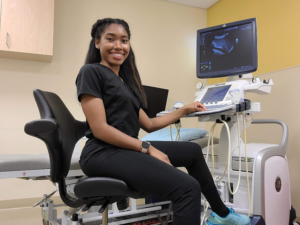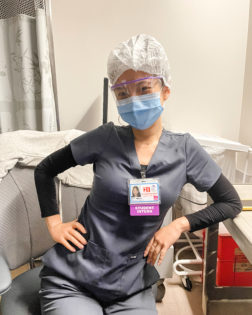Adrienne Hardy, RDMS (Ab, Ob/Gyn) – Contributor
5 Skills for Effective Communication in Your New Sonographer Employee Orientation
“Communication is power. Those who have mastered its effective use can change their own experience of the world and the world’s experience of them. All behavior and feelings find their original roots in some form of communication.” -Tony Robbins
Stepping into training at a new job can be overwhelming. There are a whole new set of policies and procedures, faces and names and protocols to remember. In some workplaces you will be assigned a mentor to orient you to the site.
Sometimes this can be helpful but whenever dealing one on one there are chances for conflict. To help ease the transition, I’ve created five helpful tips to help you succeed in your training and transition into being a contributing member of the team.
1. Make sure you clarify what you don’t know.
Do not guess! If you have a question don’t be ashamed to ask. It is way better to avoid a mistake than to have to patch something up afterwards. Your whole team will thank you for it too; it creates less work for everyone if you ask before doing. Plus, it’s better patient care to do the right thing in the first place.
2. Ask your trainer what you could have done to make your exam better.
This may feel humbling but they may even give you a few compliments on what you’ve done well! It is really great to open this line of communication and receive direct feedback about what your new job is looking for from their exams and sonographers and what you can do to reach that level.
I found that asking this question not only gave me goals but it also created an opening for my trainer to impart new knowledge about pathology and exams they have done, or even corrections they have received from radiologists before. And anytime you can spare making the same mistake someone else has made, it is worth it!
3. Communicate where you feel weak.
Listen, I’m all for “fake it till you make it” but sometimes you feel that some exams or skills are harder than others. That’s normal. For example, I struggled a lot with transvaginal exams when the uterus was retroverted. The maneuvering and orientation kept getting confused in my mind. I told my trainer that I needed work on those and the next day she put my name next to every transvaginal pelvic exam on for the day.
I would tell her that sometimes I need to reason through something for myself and she would let me have the space to do that and mess up while still under the safety net of her watchful eye. It is great to confide in someone more experienced and let them guide you through, so trust the system.
4. Don’t be afraid to stand up for yourself and be confident.
There are times when only the person doing the live scan can make a judgment call about what they are seeing. If you have thoroughly swept through the organ and made a determination about the pathology (or lack of) and it is questioned, feel assured to politely stand up for yourself.
For example, lymph nodes in the neck can be tricky unless you are scanning live. If you have seen the lymph node in two planes and with color, be confident in what you know and feel confident in saying so when it is questioned.
If you have supportive coworkers they should either back you up or give you a helpful solution. If they don’t readily present this option, then ask!
5. Remember that the people that hired you want you to succeed.
Everyone wants a great coworker. Every boss wants a strong employee. The people you work with want you to do a great job, and if some days seem a bit hard that’s okay! They want you to be excellent and when they push for something better it is out of a desire to get you to the next level.
Try to frame it in your mind as such. No boss wants to hire someone that won’t be able to take full responsibility in the role or that they expect to fail. They believed in you at that interview and now all you have to do is believe in yourself and your team!

Adrienne Hardy earned her bachelor’s degree from Florida State University in theatre, mass media communications and child development. After working a random assortment of jobs from costume character, deck hand, kickboxing trainer, preschool teacher, and scuba diver she decided to dedicate her life to a lasting career of helping people with diagnostic ultrasound.
Based in Orlando, Florida, Adrienne graduated in 2021 and now works at the level one trauma hospital Orlando Regional Medical Center. Find her on Instagram: @smile_outloud

Candice Sellers, B.S., RDMS – Contributor Students attending ultrasound school consistently report that ultrasound physics is one of the most difficult courses in their program. It’s a required course and one that is important to master. Below you will find study tips and tools available to students to help them focus and hone in on…
How I Mastered Ultrasound Physics

By Adrienne Hardy, RDMS (Ab, Ob/Gyn) – Contributor According to the SDMS, 90% of sonographers will sustain a work related musculoskeletal disorder; 20% will have a career ended because of the injury. With numbers this high it seems like it’s an inescapable truth that you must scan in pain or get injured at some point…
Most Common Injuries in Sonographers

By Adrienne Hardy, RDMS (Ab, Ob/Gyn) – Contributor As I sat in my entrance interview for sonography school the professors spattered me with questions: “Do you have enough savings? What is your home like? How do you manage your time? Do you have someone who cares about your success and will support you in hard…
Surviving and Thriving in Sonography School

We recently had the pleasure of speaking with Carlos Reveles, a high risk Ob/Gyn sonographer. In this interview, Carlos shares with us what led to him being recently recognized as a standout sonographer by his employer, and what it’s like being a male in a traditionally female field. Welcome Carlos! Hello my Name is Carlos…
Explore Carlos’s Sonography Journey

Adrienne Hardy, RDMS (Ab, Ob/Gyn) – Contributor I clicked submit on the SPI physics exam and ran out the the room. The test proctor handed me a piece of paper with a huge scared looking picture of myself taken before the exam, my ARDMS number and the results of my SPI examination. My hand shook as…
Passing the Sonography Principles and Instrumentation Exam

Candice Sellers, B.S., RDMS – Contributor The Ultrasound School Experience Ultrasound school is a very exciting and rewarding experience. The excitement of finally reaching your goal of getting accepted into an accredited ultrasound program is certainly a tremendous milestone! However, there will be moments of frustration and stress that will occur during your journey in…
How I Managed Stress While in My Sonography Program

DruAusten Fields, RDMS (AB, OB/GYN), RVT – Contributor The Skilled Sonographer, DruAusten Fields, RDMS (AB, OB/GYN), RVT looks back on the development of her SPI test prep mini-course, and her work to help others pass their SPI exam. When I look back on where I started versus where I am, I can confidently say I have…
Tap into Dru’s Diagnostic Imaging Expertise

Adrienne Hardy, RDMS (Ab, Ob/Gyn) – Contributor What to expect as you transition from DMS student to the medical imaging workplace. Congratulations! You ran the marathon of Sonography school and now have gotten a job! What a relief, right? All the pent up anxiety and pressure of ultrasound school feels let off like a pressure valve…
Surviving the Transition: From Student to Sonographer Pro!

Lynn Nguyen – Sonography Student & Contributor Join Lynn on her journey as she pursues a 2nd career as a sonographer. Why Sonography? How Did I Get Here? I have never given sonography a thought much less loving the thought that I am going to be a sonographer one day. In high school I knew…
Why I Chose Diagnostic Medical Sonography

DruAusten Fields, RDMS (AB, OB/GYN), RVT – Contributor The Skilled Sonographer, DruAusten Fields, RDMS (AB, OB/GYN), RVT shares her sonography story! From Indecision to Decision Deciding on a lifelong career can be stressful, especially at a young age. During high school was when I began toying with the idea of pursuing a career in the…
Systems for Success in Sonography

Sam Callis, contributor at USI, is an author and sonographer with experience in multi-specialty clinical practice, higher education, and the medical device industry. She is the author of Diagnostic Medical Sonography – The Definitive Guide to Planning Your Career. We were first introduced to Samantha back in 2019 with this terrific interview in which she…
From Art to Science: A Sonographer’s Unique Career Path
The demand for healthcare professionals, including those specializing in medical imaging, continues to rise. As the aging baby boomer population grows, there is an increasing need for diagnostic imaging procedures, alongside a demand for new providers to fill positions vacated by retiring workers. This ongoing expansion in medical imaging careers presents excellent opportunities for individuals…
Updated for 2025













